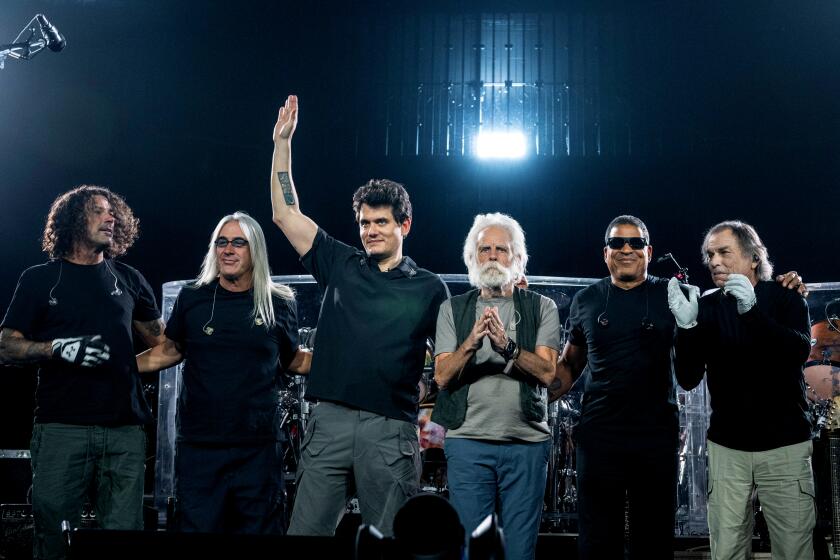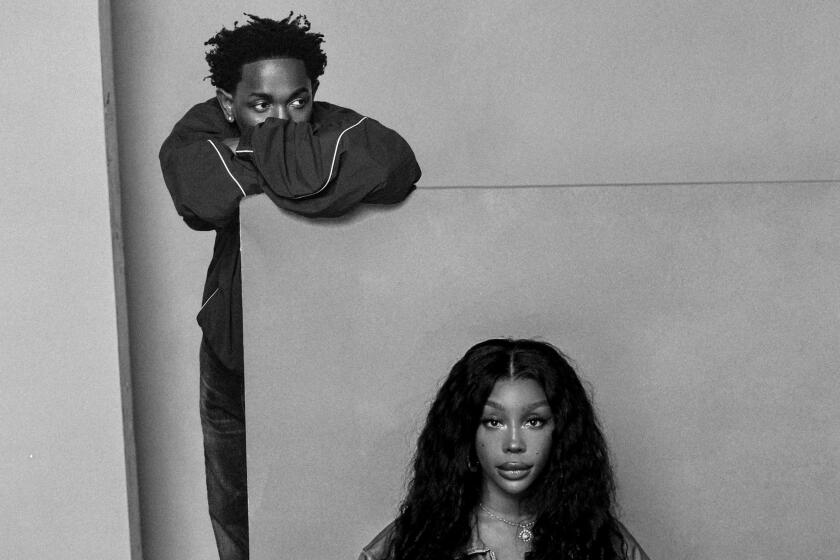2012 in review: Kendrick Lamar, Frank Ocean bring fresh sounds to L.A.
Click through the gallery above to view my top 10 albums of 2012.
On or near the top of many of 2012’s best albums lists -- mine are listed above within a clickable gallery -- are two Angelenos: Kendrick Lamar and Frank Ocean. They earned their praise, Ocean with his Grammy-nominated “Channel Orange,” a genre-busting slice of L.A. life that highlights the singer-songwriter’s myriad talents, and rapper Lamar with his “good kid, m.A.A.d. city,” a lyrically thrilling, musically urgent document of working-class street life.
Within both is a buzzing city built on dreams but filled with nooks, enclaves and trapdoors.
Their experiences of Los Angeles couldn’t be more different: Navigating the region from opposing perspectives, one an insider and one an outsider, Lamar and Ocean create a remarkable yin-yang of the California dream.
Best of 2012: Movies | TV | Pop music | Jazz | Video Games | Art | Theater | Dance | Classical music
Ocean, 25, born in New Orleans and transplanted here six years ago, touches on the Cali of the imagination. Like many who land here, the artist born Christopher Breaux relocated to reinvent himself and make a career as a professional artist and songwriter. Within a few years he’d done that and more: written with Beyoncé, signed with Def Jam and hooked up with the rising Odd Future collective. He conveys experiences as a new Angeleno “lost in the thrill of it all” by creating his own figurative channel — it’s orange, like the California sun.
Lamar’s also 25, a Compton native born Kendrick Lamar Duckworth who came up in the city. Born half a decade before the ’92 riots, the rapper with precocious talent has the support of the King of Compton, Dr. Dre, who signed him to his Aftermath imprint. Lamar describes himself on “good kid, m.A.A.d. city” as “Compton’s human sacrifice,” and throughout the record he documents with an astute voice and the assured lyrical rhythm of a beat box percussionist.
He’s Iceberg Slim for a new century, who with pinpoint accuracy evokes a post “Boyz N the Hood” world of a young man on the move: “You love streets, you love runnin’, duckin’ police, You love your hood, might even love it to death,” he raps on “Real.”
The acronym in the album’s title has two meanings: “My angry adolescence divided” and what Lamar describes as “the basic standout meaning, ‘My angel’s on angel dust.’”
Like any accurate document of Los Angeles, much of “good kid” occurs in cars. On “The Art of Peer Pressure” he’s with friends cruising “four deep in a white Toyota,” rolling down the 405 with “a quarter tank of gas, a pistol, orange soda,” eyeballing “the light-skinned girls in all their little dresses.” He’s a veritable Google maps of our town. In “Backseat Freestyle,” Lamar suggests to a driver looking for a space to “park it in front of Lueders, next to that Church’s Chicken” at the corner of Rosecrans Avenue and Bullis Road in Compton.
Ocean’s world encompasses the south of his youth and the L.A. of his present and the gulf that separates them. On “Sweet Life,” Ocean describes someone “Livin’ in Ladera Heights/ The black Beverly Hills/ Domesticated paradise/ Palm trees and pools.” On “Super Rich Kids,” as accurate a document of blue-blood L.A. as has ever been written, Ocean conjures a life filled with fine drink and smoke — “too many bottles of this wine we can’t pronounce/ Too many bowls of that green, no Lucky Charms.” Embedded within the song is another young voice of L.A., Earl Sweatshirt, who exquisitely embodies the subjects as “the Xany-gnashing, Caddy smashing, bratty-ass” kids.
Perhaps most thrilling, in fact, is that Lamar and Ocean are part of bigger creative entities, perhaps one reason why the two have yet to collaborate: the former is part of Black Hippy, a four-DJ L.A. collective that also features striking talents Ab-Soul, Schoolboy Q and Jay Rock. Ocean came into his own after joining Odd Future, the chaotic Fairfax posse founded by Tyler, the Creator, who, along with fellow members Sweatshirt, Syd the Kid and others, have helped reinvigorate hip-hop.
Such convergence of talent doesn’t happen often. When it does, it’s wondrous to behold. What Ocean and Lamar have achieved is not only notable in the year-end roundup scheme of things but suggests a thrilling new chapter of Los Angeles music unfolding before our very ears.
More to Read
The biggest entertainment stories
Get our big stories about Hollywood, film, television, music, arts, culture and more right in your inbox as soon as they publish.
You may occasionally receive promotional content from the Los Angeles Times.










